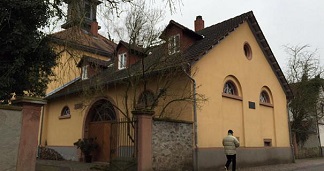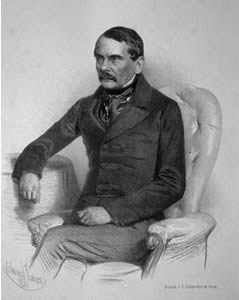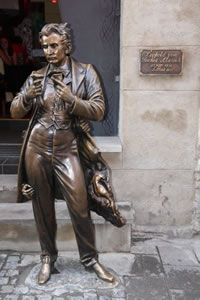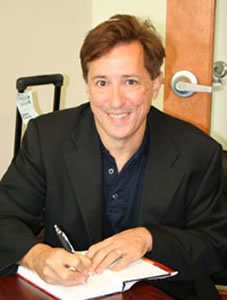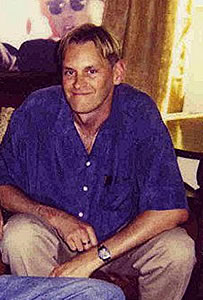De Engelse dichter en schrijver Lewis Carroll werd op 27 januari 1832 in Daresbury. Zie ook mijn blog van 27 januari 2007 en ook mijn blog van 27 januari 2008.
Epilogue to Through the Looking Glass
A boat, beneath a sunny sky
Lingering onward dreamily
In an evening of July —
Children three that nestle near,
Eager eye and willing ear
Pleased a simple tale to hear —
Long has paled that sunny sky:
Echoes fade and memories die:
Autumn frosts have slain July.
Still she haunts me, phantomwise
Alice moving under skies
Never seen by waking eyes.
Children yet, the tale to hear,
Eager eye and willing ear,
Lovingly shall nestle near.
In a Wonderland they lie,
Dreaming as the days go by,
Dreaming as the summers die:
Ever drifting down the stream —
Lingering in the golden gleam —
Life what is it but a dream?
Lewis Carroll (27 januari 1832 – 14 januari 1898)
De Duitse schrijver Benjamin von Stuckrad-Barre werd op 27 januari 1975 in Bremen geboren. Zie ook mijn blog van 27 januari 2007 en ook mijn blog van 27 januari 2008.
Uit: Was.Wir.Wissen.
“Alles kann man nicht wissen. Das weiß jeder. Bis immerhin Goethe (†1832) war das Weltwissen noch so überschaubar, dass man es sich komplett aneignen konnte – angeblich. Heute weiß man mehr und keiner mehr alles. Doch was man wenigstens wissen sollte, wird gern und häufig diskutiert und tabellarisch daherbehauptet. Allgemeinbildung!
Sollte man haben. Überhaupt: Das Wissen eines jeden wächst natürlich von Geburt bis Tod. Man lernt dazu – und wozu genau? Zum schon Gewussten, Abgenickten, Bewiesenen. Und wofür, das weiß man ja auch, nämlich nicht für die Schule. Sad vitae, traurige Lebensläufe. Ein Witz, ein Fehler? Vielleicht auch ein Filmtitel. Mal nachgucken – und schon ist man drin.
Das ideale Medium, Wissen zu archivieren, zu verbreite(r)n, stetig, vertieft zu verknüpfen, ist mit dem Internet gefunden. Finden kann man dort alles, nur verliert man sich (tatsächlich und wortwörtlich alles Mögliche findend) bei der Suche gern einmal. Was es alles gibt, staunt man und ist so ratlos wie fasziniert. Es gibt nichts, was es nicht gibt, heißt es im so genannten Volksmund. Dieser wird gemeinhin als Urheber und Benutzer solcher Weisheiten, Bezeichnungen und Redewendungen identifiziert, deren Gebrauch zum Brauch geworden ist.
In diesen Prozess von Sprach- und Wissensentwicklung ermöglicht das Internet frühzeitig Einblick und Teilnahme. Jeder darf mitdefinieren. Und die relative Gleichförmigkeit von Präsentation, Zugänglichkeit und Ausschilderung von Quellen sehr unterschiedlicher Qualität spiegelt und potenziert die Verwirrung. An Wegweisern, Empfehlungen, Leitplanken und Abholungsangeboten mangelt es so wenig wie an Warnungen, Abschreckungen und Alternativen. Pisa usw.? Eher Babel und so www. Es wird Zeit, diesem Maul mal aufs Volk zu schauen.
Benjamin von Stuckrad-Barre (Bremen, 27 januari 1975)
De Franse schrijfster Eliette Abécassis werd geboren op 27 januarri 1969 in Straatsburg. Zij bezocht er de École normale supérieure en studeerde later filosofie. Voor haar eerste roman Qumran deed zij drie jaar lang onderzoek. De roman was meteen een groot succes en werd in achttien talen vertaald. Werk: o.a. L’Or et la cendre, 1997, La Répudiée, 2000, Le Trésor du temple, 2001, Un heureux événement, 2005, Mère et fille, 2008.
Uit: Mon père
« Il y a deux ans, lorsque j’ai perdu mon père, je n’avais plus de goût à la vie. Plus rien, plus personne ne trouvait grâce à mes yeux, et je me suis laissé envahir par une force inquiétante et diffuse, qui m’aspirait, m’empêchant de me lever le matin, de sortir et de voir des amis, sans que je puisse rien faire. Je n’avais pas le courage de lire, et regarder la télévision me fatiguait. Je m’endormais facilement, mais je me réveillais prématurément. Je me réveillais, misérable, malheureuse du jour qui se lève, et je me couchais, sans attente du jour qui suit. Je déambulais dans mon appartement, seule, et je commençais à perdre tout espoir de retrouver un sens à mon existence, lorsqu’un matin, j’ai reçu une lettre venant d’Italie, de la part d’un homme qui cherchait des renseignements sur un certain Georges B.
Georges B., c’était le nom de mon père. L’homme qui m’avait adressé ce courrier ne m’en disait pas plus, mais il me priait de lui répondre rapidement, car «c’était une chose importante pour lui». Je lui ai aussitôt renvoyé un message, dans lequel je lui écrivais que je connaissais la personne qu’il recherchait, qu’elle était décédée, et que j’étais sa fille. Quelques jours plus tard, j’ai reçu un mot du même individu. Il me disait qu’il s’appelait Paul M. et qu’il était le fils de mon père.
Alors je me suis souvenue d’une photo, une photo d’un petit garçon que j’avais trouvée dans la veste de mon père. Sans pouvoir l’expliquer, immédiatement, j’ai su que cet homme disait vrai. »
Eliette Abécassis (Straatsburg, 27 januarri 1969)
De Amerikaanse schrijver Ethan Mordden werd geboren op 27 januari 1947 in Pennsylvania. Zie ook mijn blog van 27 januari 2007 en ook mijn blog van 27 januari 2008.
Uit: All That Glittered
“Lightnin’ Has Struck!
When Frank Bacon left school at the age of fourteen, his native California counted more jobs to fill than skilled labor qualified to fill them. If not exactly the anarchic frontier of legend, California in the 1880s nevertheless offered opportunity to anyone with—as they put it then—gumption. Young Bacon tried sheepherding, advertising soliciting, and newspaper editing, and even ran an unsuccessful campaign for the state assembly. Then he fell into acting.
It was easy to do at the time, for people went to theatre then almost as casually as they turn on the television today, and playhouses were literally everywhere. Some were operated by resident repertory troupes, the “stock” companies that sustained public interest with a constantly changing bill. Certain theatres in a given region were linked to form “wheels” of companies not resident but traveling as wholes from one house to another every six weeks or so; unlike the stock companies, who played everything, the wheels played host to certain genres, for instance in thrill melodrama or society comedy.
The expansion of the railroad doomed stock and eventually closed down the wheels, for now the “combination” troupe dominated the national stage: one unit of actors giving a single work and touring with all the necessary sets and costumes. A success in this line meant moving from one theatre to the next
(with perhaps a hiatus in summer) for months or even years. Along with bookings in small towns and provincial capitals lay the possibility of an extended run in Chicago or New York.“
Ethan Mordden (Pennsylvania, 27 januari 1947)
De Belgische, Franstalige, schrijver Guy Vaes werd geboren op 27 januari 1927 in Antwerpen. Vaes werd journalist. Eerst in Antwerpen voor Le Matin en La Métropole, later voor het Brusselse weekblad Spécia . Hij was chef van wat,,de sociaal-culturele rubriek” werd genoemd en schreef over literatuur, muziek en film. In 1956 verscheen zijn roman Octobre long dimanche die een vergelijkbare impact had als Le Voyeur van Alain Robbe-Grillet die in hetzelfde jaar verscheen. Daarna duurde het tot 1983 voordat er een tweede roman, L’Envers, verscheen. Vaes schreef verder ook gedichten en essays.
Uit : Une descente aux Enfers. À propos de Hugo von Hofmannsthal
„On a souvent insisté sur les alternances du Haut et du Bas chez Hofmannsthal. En ce qui concerne le romancier que je suis, c’est le Bas, dans son interaction avec le Haut, mais un Haut menacé d’occultation, qui me parle. Le « réalisme » de Hofmannsthal est celui du visionnaire qui accuse la visibilité du réel. Relisez ses descriptions de faubourgs et de nature souillée. Jamais il ne perd de vue, soucieux de la dynamique narrative (et je cite ici l’un de ses aphorismes), que « le secret de la vie, c’est l’antithèse ».
Descendons à présent les degrés qui vont du Haut jusqu’au Bas. Ils sont liés, inextricablement, sans toutefois former d’amalgame. L’un n’a point de sens sans l’autre. Leur interaction est ininterrompue. Les éclairs du Haut dans les fosses du Bas, les exhalaisons du Bas infiltrant l’oxygène à l’état naissant du Haut. Pas de manichéisme ici. Seulement des extrêmes qui alternativement se touchent sans qu’intervienne un accord. L’unité de l’Être, car c’est toujours à elle
qu’on est reconduit, nous ne pouvons/savons la percevoir qu’à la faveur d’une illumination. Elle n’est pas un objet dont on dispose. Elle est ce qui nous assaille.
Faisant appel à ce que les Grecs nomment le terrible (ce dehors chargé de menaces), ainsi qu’à l’illumination émerveillante, Hofmannsthal se reporte à son voyage en Grèce, en 1908. Là, il se détourna de toute approche érudite. Toujours plus ou moins déchiré par son appartenance parentale au midi et au nord il finit par se demander ce que les Grecs peuvent encore lui apprendre. Jusqu’à ce que l’ébranle, au petit musée de l’Acropole, la révélation de cinq Corés archaïques, celles-là mêmes qui mettront en déroute Charles Maurras. En cet endroit se confondent les époques. Mythe et réalité aboutissent aux unions les plus déroutantes. La bête et la créature humaine frôlent l’osmose, et l’homme se rapproche de Dieu. Le temps d’un roulement de tonnerre, les extrêmes se touchent — presque. Revenant sur cette expérience, l’écrivain, dans un article de 1922, notera : « Ici nous devons le reconnaître, il existe un mystère de la pleine lumière.“
Guy Vaes (Antwerpen, 27 januari 1927)
De Amerikaanse schrijver James Grippando werd geboren op 27 januari 1958 in Waukegan, Illinois. Zie ook mijn blog van 27 januari 2008.
Uit: Hear No Evil
“My husband was murdered.”
Lindsey Hart spoke in the detached voice of a young widow still grieving. It was as if she still couldn’t believe that the words were coming from her mouth, that something so horrible had actually happened. “Shot once in the head.”
“I’m very sorry.” Jack wished he could say more, but he’d been in this situation before, and he knew there really wasn’t anything he could say. It was God’s will? Time heals all wounds? None of that would do her any good, certainly not from his lips. People sometimes turned to strangers for that kind of comfort, but rarely when the stranger was a criminal defense lawyer billing by the hour.
Jack Swyteck was among the best Miami’s criminal trial bar had to offer, having defended death row inmates for four years before switching sides to become a federal prosecutor. He was in his third year of private practice, steadily building a name for himself, despite the fact that he’d yet to land the kind of high-charged, high-profile jury trial that had vaulted plenty of lesser lawyers into stardom. But he was doing just fine for a guy who’d withstood an indictment for murder, a divorce from a fruitcake, and the unexplained appearance of the naked, dead body of his ex-girlfriend in his bathtub.
“Do the police know who did it?” asked Jack.
“They think they do.”
James Grippando (Waukegan, 27 januari 1958)
De Canadese Schrijver Mordecai Richler werd geboren op 27 januari 1931 in Montreal. Zie ook mijn blog van 27 januari 2007 en ook mijn blog van 27 januari 2008.
Uit: Mordecai Richler Was Here: Selected Writings
„One St. Urbain Street day cribs and diapers were cruelly withdrawn and the next we were scrubbed and carted off to kindergarten. Though we didn’t know it, we were already in pre-med school. School-starting age was six, but fiercely competitive mothers would drag protesting four-year-olds to the registration desk and say, “He’s short for his age.”
“Birth certificate, please?”
“Lost in a fire.”
On St. Urbain Street, a head start was all. Our mothers read us stories from Life about pimply astigmatic fourteen-year-olds who had already graduated from Harvard or who were confounding the professors at MIT. Reading Tip-Top Comics or listening to The Green Hornet on the radio was as good as asking for a whack on the head, sometimes administered with a rolled-up copy of the Canadian Jewish Eagle, as if that in itself would be nourishing. We were not supposed to memorize baseball batting averages or dirty limericks. We were expected to improve our Word Power with the Reader’s Digest and find inspiration in Paul de Kruif’s medical biographies. If we didn’t make doctors, we were supposed to at least squeeze into dentistry. School marks didn’t count as much as rank. One wintry day I came home, nostrils clinging together and ears burning cold, proud of my report. “I came rank two, Maw.”

Mordecai Richler (27 januari 1931 – 3 juli 2001)
De Duitse schrijver Leopold Ritter von Sacher-Masoch werd geboren op 27 januari 1836 in Lemberg. Zie ook mijn blog van 27 januari 2007.
Uit: Mondnacht
„Es war eine klare, warme Augustnacht. Ich kam vom Gebirge herab, die Flinte auf der Schulter, mein großer schwarzer englischer Wasserhund ging müde Schritt für Schritt hinter mir und ließ die Zunge hängen. Wir waren vom Wege abgekommen. Mehr als einmal stand ich still, blickte umher und suchte mich zurecht zu finden. Dann setzte sich mein Hund regelmäßig nieder und sah mich an.
Vor uns lag ein sanftes bewaldetes Hügelland. Ueber den blauschwarzen Bäumen stand der volle rothe Mond und warf ein grelles Feuer auf den dunkeln Himmel. Groß und ruhig floß der weiße Strom der Sterne von Osten gegen Westen, tief am nördlichen Horizonte stand der große Bär. Zwischen den nahen Weidenstämmen stieg ein leichter durchsichtiger Dunst von dem kleinen Sumpfe auf, welcher in mattem grünem Schimmer zitterte, eine Rohrdommel stöhnte im Schilf. Wie wir vorwärts schritten, füllte sich die Landschaft immer mehr mit Licht. Zu beiden Seiten traten die düsteren Baumwände langsam zurück und vor uns wogte die Ebene, ein grünes schimmerndes Meer, auf dem ein weißer Edelhof mit seinen großen Pappelbäumen wie ein Schiff mit vollen Segeln schwamm. Von Zeit zu Zeit zog ein sanfter Luftstrom durch Halme und Blätter und mit ihm ein wunderbarer Ton. Als ich näher kam, entfaltete er sich in schwermüthiger Schönheit. Es war ein gutes Piano und eine geübte feine Hand spielte die Mondscheinsonate von Beethoven. Mir war es, als werfe eine wunde Menschenseele ihre Thränen auf die Tasten. Eine verzweifelte Dissonanz – dann schwieg das Instrument. Ich war kaum hundert Schritte von dem kleinen einsamen Edelhofe entfernt, dessen finstere Pappeln trübselig rauschten. Ein Hund rasselte traurig an seiner Kette, ein fernes Wasser sang einförmig, weinerlich durch die Nacht.

Leopold von Sacher-Masoch (27 januari 1836 – 9 maart 1895)
De Russische schrijver Mikhail Saltykov-Shchedrin werd geboren op 27 januari 1826 in Spas-Ugol, Tver. Zie ook mijn blog van 27 januari 2007.
Uit: How a Muzhik Fed Two Officials
„Once upon a time there were two Officials. They were both empty-headed, and so they found themselves one day suddenly t
ransported to an uninhabited isle, as if on a magic carpet.
They had passed their whole life in a Government Department, where records were kept; had been born there, bred there, grown old there, and consequently hadn’t the least understanding for anything outside of the Department; and the only words they knew were: “With assurances of the highest esteem, I am your humble servant.”
But the Department was abolished, and as the services of the two Officials were no longer needed, they were given their freedom. So the retired Officials migrated to Podyacheskaya Street in St. Petersburg. Each had his own home, his own cook and his pension.
Waking up on the uninhabited isle, they found themselves lying under the same cover. At first, of course, they couldn’t understand what had happened to them, and they spoke as if nothing extraordinary had taken place.
“What a peculiar dream I had last night, your Excellency,” said the one Official. “It seemed to me as if I were on an uninhabited isle.”
Scarcely had he uttered the words, when he jumped to his feet. The other Official also jumped up.
“Good Lord, what does this mean! Where are we?” they cried out in astonishment. They felt each other to make sure that they were no longer dreaming, and finally convinced themselves of the sad reality.“
Mikhail Saltykov-Shchedrin (27 januari 1826 – 10 mei 1889)
Portret door Ivan Kramskoi
De Russische dichter en schrijver Ilja Ehrenburg werd geboren op 27 januari 1891 in Kiev. Zie ook mijn blog van 27 januari 2007.
1957
I could have lived a completely different life,
and the soul was once created
for some kind of Moscow dacha,
where from the walls drips the dew.
Where you walk awakened by the sunrise
to the slope of the rivers shore,
and to see how in the dreamy humidity
little funny spiders run around.
My dear, my distant, please relate,
why have you become my torment,
why I will never come to you,
not able to come to you forever? …
Ilja Ehrenburg (27 januari 1891 – 31 augustus 1967)
De Franstalige, maar oorspronkelijk Nederlandse schrijfster Neel Doff werd geboren in Buggenum op 27 januari 1858. Zie ook mijn blog van 27 januari 2007.
Uit: Keetje Tippel
„Moeder was de hele morgen bezig geweest ons te wassen en aan te kleden en had geen tijd gehad om aardappels te koken; wij aten wat brood en dronken koffie. Om twee uur kwam ouwe Dientje, een buurvrouw, ons ophalen voor de kermis op de Nieuwmarkt. Wij gingen op stap, moeder met de baby en Dientje met Naatje op de arm; de groten – twee jongens en twee meisjes – liepen hand in hand voorop.
Hoe wij naar de Nieuwmarkt kwamen, die een heel eind van ons huis lag, herinner ik mij niet meer. Zoveel weet ik nog wel, dat wij ons onverhoeds midden in de menigte bevonden; dat voor de kermistenten dames in engelenjurken boven op paarden in geborduurde stroken zijde zaten; dat een man die in de meel was rondgerold met een schorre zangstem stond te lachen; dat de draaimolens, rondom versierd met bebloemde stoffen, ronddraaiden terwijl mannen en vrouwen arm in arm hosten en zongen bij het orgel, dat door trompetjes een wijsje uitschetterde: Hopla met de benen, het zijn geen molenstenen!
Hele troepen dienstmeisjes, met hun hoed over hun mutsje gestolpt en een omslagdoek over de schouders, liepen gearmd met werklui te zingen en te springen van ‘hossen, hossen, hossen’. Wit van angst stompte moeder mij voor zich uit: ‘Hier blijven lopen, lelijke meid, als je niet oppast lopen ze ons nog onder de voet!’ Tenslotte deed ze zo lelijk tegen me, dat ik de hand van Hein losliet en langs een gracht wegrende. Maar opeens besefte ik in paniek dat ik daar alleen stond en de weg naar huis niet wist. Ik klampte een voorbijganger aan.
‘Als je hier langs de gracht blijft lopen, kom je bij de Amstel. Daar moet je linksaf en dan vind je je straat wel.’
Neel Doff (27 januari 1858 – 14 juli 1942)
De Nederlandse schrijver Rudolf Geel werd geboren in Amsterdam op 27 januari 1941. Geel is docent taalbeheersing aan de Universiteit van Amsterdam. Hij publiceerde de verhalenbundels Trage schaduwen (1991) en Een dichteres uit Los Angeles (1994), en de romans De paradijsganger (1988) en Dierbaar venijn (1992). Hij bezocht als gastdocent van het Instituut voor de Opleiding van Leraren enkele malen Suriname, en publiceerde daar ook de handleiding Het schrijven van leesbare teksten en brieven (1995). Ook in 1995 publiceerde hij de essaybundel Volmaakte schrijvers schrijven niet, over het scheppingspoces van literaire en andere teksten. Hij was redacteur van het algemeen-culturele tijdschrift De Gids en voorzitter van het Nederlandse Centrum van de internationale schrijversvereniging de P.E.N.
Uit: Het eerste artikel
“Ik zou er heel wat voor over hebben als ik mijn allereerste stukje nog bezat. Het was helemaal niets. En toch stonden er woorden op papier. Die middag leerde ik versneld mijn eerste les: als je gaat schrijven, dan moet je wel een onderwerp hebben en daarnaast bij voorkeur geen pretenties. Veel schrijven levert niet alleen ervaring op, maar ook onderwerpen die bij een volgende gelegenheid soms in een geheel nieuw licht geplaatst kunnen worden.
Een jaar na mijn debuut, dat ik niet inleverde, schreef ik overigens desnoods in mijn eentje het schoolblad vol. Dat kwam omdat ik, geholpen door de eerste ervaring, snel een tweede les leerde: er zijn onderwerpen te over, als je maar niet te ver van huis gaat. Mijn allereerste artikel ging natuurlijk over iets heel ingewikkelds. Waarom schreef ik die middag bij mijn grootouders niet over bijvoorbeeld jazzmuziek, waarover ik in die tijd volop meningen had? Een jaar later had ik dat beter begrepen.Vervolgens leerde ik een derde les, die ik schrijvers in spe nog graag voorhoud: alleen brutale mensen slagen in het schrijversvak. Al zijn ze als persoon nog zo aardig, achter de tekstverwerker moeten schrijvers veranderen in wolven. Als schrijverswolf mogen ze vervolgens uitsluitend bijten in mensen die in principe sterker zijn dan zij. Helaas wordt dit eenvoudige uitgangspunt, dat de trots uitmaakt van het vak, al te vaak genegeerd.”

Rudolf Geel (Amsterdam, 27 januari 1941)
De Duitse schrijver Balduin Möllhausen werd geboren op 27 januari 1825 in Bonn. Zijn publicaties “Tagebuch einer Reise vom Mississippi nach den Küsten der Südsee” en “Reisen in die Felsengebirge Nordamerikas bis zum Hochplateau von Neu-Mexiko behoren tot de beste en populairste reisbeschrijvingen uit de 19e eeuw. Van hem stammen ook de eerste beelden van de Grand Canyon en van de daar levende Mohave- und Wallapai-Indianen. Hij werd gesteund door Alexander von Humboldt en was een kennis van Theodor Fontane. De ervaringen en herinneringen die hij tijdens zijn reizen opdeed verwerkte hij in meer dan veertig romans en talrijke verhalen en novellen.
Uit: Die Mandanenwaise
„Der eisige Novembersturm streift die letzten braunen Blätter von den Bäumen und wirbelt sie mit vereinzelten kleinen Schneeflocken durcheinander. Bleifarbig hängt der Himmel über der öden Landschaft, als ob er sich in jedem Augenblick auf die Erde niedersenken wolle, um das letzte im Freien zurückgebliebene Leben gewaltsam zu erstarren.
Ohne Furcht oder Bedauern über meinen Entschluß sehe ich dem Winter entgegen, den langen einsamen Nächten und den kurzen Tagen. Ohne Furcht oder Bedauern stehe ich im Begriff, mich aus Monate in diese Wildniß zu vergraben, in eine Wildniß, in welcher keine menschliche Stimme an mein Ohr dringt, der Ton meiner eigenen Stimme von Niemand gehört, unheimlich in den endlosen Räumen verhallt.
Doch nein, ich darf nicht ungerecht sein; denn während ich die Geschichte meines wechselvollen Lebens niederschreibe, werde ich mit schüchterner Anhänglichkeit beobachtet, und wenn ich von meiner Arbeit zufällig emporschaue, blicke ich in die dunklen melancholischen Augen eines indianischen Kindes, meines Schützlings, wahrscheinlich einer der Letzten des einst so mächtigen und glücklichen Mandanenstammes.
Das arme Mädchen, welches mit dankbarem Herzen zu mir, wie zu einer Gottheit emporblickt, mildert das traurige Gefühl der gänzlichen Vereinsamung, welches mich bei dem Gedanken an den langen, unerbittlich strengen Winter beschleicht. Ich kann mir wenigstens sagen: »ich bin nicht allein;« und ist es mir auch nicht vergönnt, mit dem armen, von der ganzen Welt verlassenen Wesen eine meiner Vergangenheit entsprechende Unterhaltung anzuknüpfen, se vermag ich es doch zu belehren, zur Aufnahme in eine Mission vorzubereiten und damit einen guten Zweck zu erfüllen.“
Balduin Möllhausen (27 januari 1825 – 28 mei 1905)
Zie voor onderstaande schrijver ook mijn blog van 27 januari 2008.
De Duitse dichter en schrijver Bernd Jentzsch werd geboren op 27 januari 1940 in Plauen. Zie ook mijn blog van 27 januari 2007.
